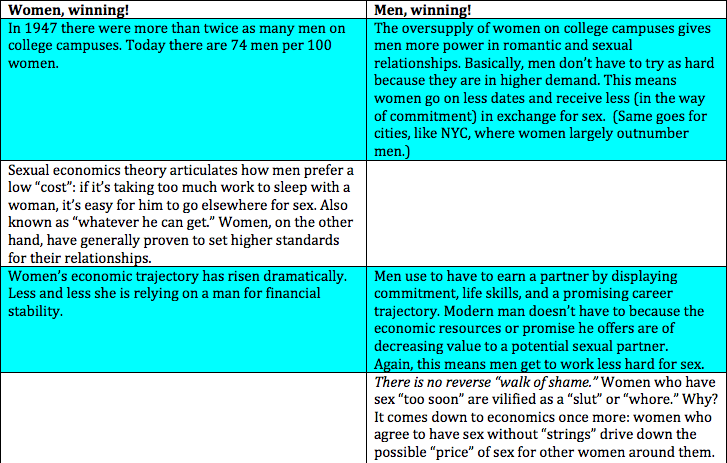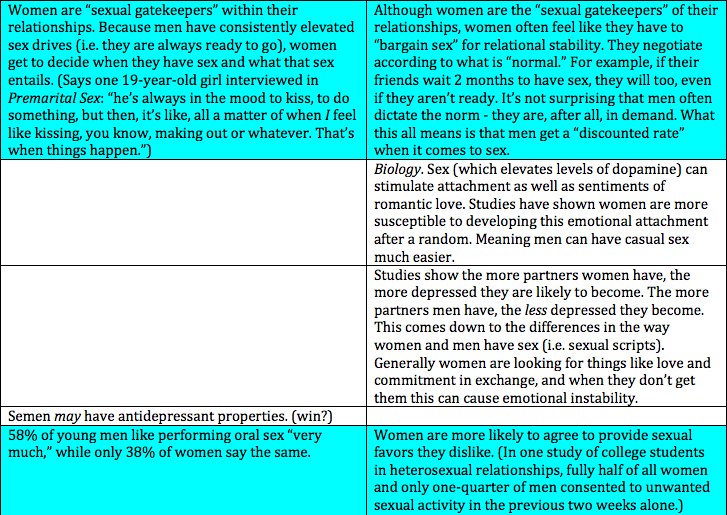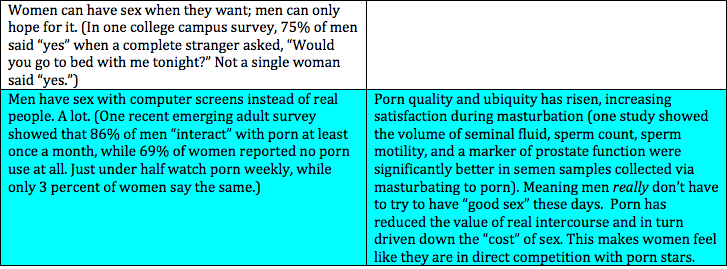By Michelle Rafferty
As most of you probably know by now, there’s a new stage in life – emerging adulthood, or for the purposes of this post, the unmarried young adult. Marriage is getting pushed off (26 is now the average age for women, 28 for men) which means…more premarital sex than ever!
According to sociologists, emerging adults are all part of a sexual market in which the “cost” of sex for men and women in heterosexual relationships is pretty different. Out of this disparity has risen the theory of “sexual economics,” which I recently read up on in Premarital Sex in America: How Young Americans Meet, Mate, and Think about Marrying. At first glance women appeared to be the clear losers in this market. See this passage:
Sexual economics theory would argue that sex is about acquiring valued “resources” at least as much as it is about seeking pleasure. When most people think of women trading sex for resources, they think of prostitution and money as the terms of exchange. But this theory encourages us to think far more broadly about the resources that the average woman values and attempts to acquire in return for sex – things like love, attention, status, self-esteem, affection, commitment, and feelings of emotional union. Within many emerging adults’ relationships, orgasms are not often traded equally.
Basically, the sexual economics theory says that while women and men are doing the same thing during sex, socially they are doing two different things. Women can and do enjoy sex, but they also have an agenda, while men…just want to have sex. Which to me just seemed, well, sad. Hadn’t women all finally agreed that a man can’t ever make you happy, only you can? But the more I read up on the theory of sexual economics, the less cut-and-dry it became. Women might use sex to get commitment, but they’re also getting things like advanced degrees and independent financial stability - which also play a role in this new sexual economy. This led me to ask: are men really the clear winners in this game? I scoured the countless studies and interviews in Premartial Sex in America and came up with the following chart to sort all the data out.
Wins in the Emerging Adult Sexual Market by Gender




Tally:
Women &
By Anatoly Liberman
Last week I mentioned the idiom to be (dead) nuts on ‘to be in love with’ and the verb spoon ‘to make love’ and promised to say something about both. After such a promise our readers must have spent the middle of January in awful suspense. So here goes. The semantic range of many slang words is often broad, but the multitude of senses attested for Engl. nut (see the OED) is amazing. I will reproduce some of them, both obsolete and current: “a source of pleasure or delight” (“To see me here would be simply nuts to her”), nuts in the phrases to be (dead) nuts on “to be in love of, fond of, or delighted with,” to be nuts about, as in “I was still nuts about Rex,” and to be nuts “go mad” (hence nutjob ~ nut job ~ nut-job “madman; idiot” and nutsy “crazy”). The exclamation nuts! means “nonsense,” while, contrary to expectation, the nuts signifies an excellent person. It will be seen that the senses can be positive, as in “a source a delight” (here are two more examples from my reading: “An English country gentleman might express himself concerning an agreeable incident: ‘It was nuts’” and “To edge his way along the crowded paths of life, warning all human sympathy to keep its distance, was what the knowing ones call ‘nuts’ to Scrooge”), and negative (“madness; stupidity”). Consequently, tracing nuts to German von Nutzen “of use” would be a false move (this origin of nuts has been proposed by a good German scholar). In etymological works, it is common to preface a hypothesis by a disclaimer to the effect that someone may have offered the same hypothesis, but the author is ignorant of it. I am obliged to do the same: my idea is so obvious, even trivial, that it must have occurred to anyone who wondered what nuts (as in hazelnuts or peanuts) have to do with either extreme pleasure or derangement.
The slang word nut in the singular is also frequent, but we note that in all the examples given above the plural nuts occurs. I suspect that the story begins with nuts “testicles,” even though the earliest recorded examples of this sense are late (however, it must have been so well-known in the United States more than a hundred years ago that The Century Dictionary included it). Nuts and genitalia have been compared for centuries. Thus, nut occurred with the sense of “the glans penis,” and the Germans call this part of the male organ of procreation Eichel “acorn” (in older writings on the history of words the glosses in such situations were always given in Latin; those who are embarrassed by plain English are welcome to use membrum virile). I suggest that nuts emerged as a loose word for expressing a strong feeling: nuts! “nonsense,” nuts! “wonderful,” nuts! “crazy,” and so forth. Such an exclamation can express any emotion. Nut “head” is probably an independent coinage (the head has been likened to all kinds of oblong and round objects in many languages); hence off one’s nut, though nuts “mad” may have reinforced that phrase. (The Russian verb o—et’, whose middle contains the most vulgar and formerly unprintable name for “penis,” means “to become mad”—another instance of genitalia and madness being connected; compare the metaphorical sense of Engl. prick).
Naturally, since nuts existed, the singula





